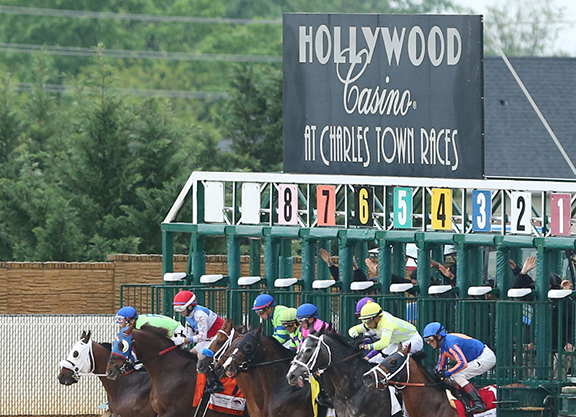By T. D. Thornton
The imperiled GII Charles Town Classic is back on for Apr. 21 after a West Virginia Racing Commission (WVRC) vote on Monday reversed a controversial decision the WVRC made two weeks ago not to approve a fully funded version of the signature $1.2 million stakes event at Charles Town Races.
But commissioners at the Feb. 5 meeting–which was called on short notice and featured just this one agenda item–made it clear that the commission-versus-racetrack debate over using contracted purse money for carding big stakes races isn't over yet.
On Monday, prior to repealing the Jan. 23 vote that stipulated an unorthodox “matching” purse scheme for the Classic, and then voting 3-0 for the approval of Charles Town's entire 2018 open stakes schedule, WVRC chairman Jack Rossi vowed to appoint a focus group this spring after the Classic is run to look at the “allocation of purse resources” to see if a marquee graded stakes race is truly in the best interest of racing in the state.
Rossi also introduced a new twist to the conflict prior to the vote when he said that the Charles Town's decision to seek approval for its 2018 stakes races at the December 2017 meeting was akin to “slipping something through at the last minute”–even though Charles Town had only been following years of WVRC protocol by asking for seemingly perfunctory approval of its slate of stakes races.
“I think you should be planning three years in advance instead of planning 30 days in advance, and I think we need to look at it and go forward, and that's why I'm going to appoint a focus group,” Rossi said.
Ken Lowe Jr., the WVRC commissioner and former Charles Town Horsemen's Benevolent and Protective Association (HBPA) president who seven years ago had been barred from Charles Town for distributing political flyers (and subsequently said he won an undisclosed court judgment from track management when he challenged the ejection), was the commission member who in December first threatened not to approve funding for the Classic.
Lowe had argued that the purse for the race was too high, and could be better spent doled out in a series of smaller races. After the issue got tabled in December, on Jan. 23 Lowe proposed allowing funding for up to 50% of the Classic out of the horsemen's purse account, but only if the track matched the other half out of its own corporate pocket. Such a funding structure is not known to be in effect for any other major stakes race anywhere in the country, and track executives had testified that Charles Town would not race the Classic in 2018 under those terms.
Lowe had led the charge for the matching purse structure even though Charles Town's current HBPA executives said they had no problem with a $1.2 million Classic. Track management had produced a valid purse account contract with the HBPA that allowed for up to 8% of purse account money to be used for open stakes.
On Monday, Lowe said he would back off and vote for fully funding the Classic only if Rossi's idea for a focus group to study the race got acted upon.
Even so, Lowe reiterated his belief that big-money races aren't in the best interest of West Virginia. He veered backwards in time to speak about president George Washington's racing of horses in the state during colonial times, later tying the historical past into a much more recent mandate that West Virginia's video lottery terminal revenues be used for bolstering racing in the state.
“I can say the right thing at the wrong time, or sometimes the wrong thing at the right time,” Lowe said, underscoring that his “yes” vote would also be predicated on the fact that he expects “additional monies will be put in the purse fund.” He did not elaborate about how he expected that to be accomplished.
When reached by phone after the meeting, Erich Zimny, Charles Town's vice president of racing operations, said he was not entirely sure what Lowe meant by money needing to be put back into the purse fund. Zimny explained that his operations team right now is just concerned about carding a strong field for the Classic after nearly two months of uncertainty that delayed recruitment.
“We're incredibly happy that they decided to revisit the issue,” Zimny said. “Right now we're just focused on putting on the best event that we can in April, and that's going to take up the bulk of our time from now until then.”
The WVRC's Jan. 23 vote not to fund the Classic had not only placed the commission in the uncomfortable glare of the national racing spotlight, but it also elicited the threat of political repercussions within West Virginia. Within hours of the vote two weeks ago, the state's governor vowed to have the Classic decision reversed, and a state senator filed legislation to drastically alter the makeup of the WVRC itself.
After the vote, Rossi would not directly answer a reporter's question about what specifically led to Monday's about-face on the Jan. 23 vote.
“The vote is there,” Rossi said. “We're looking to the future. We're not looking in the past.”
Not a subscriber? Click here to sign up for the daily PDF or alerts.






